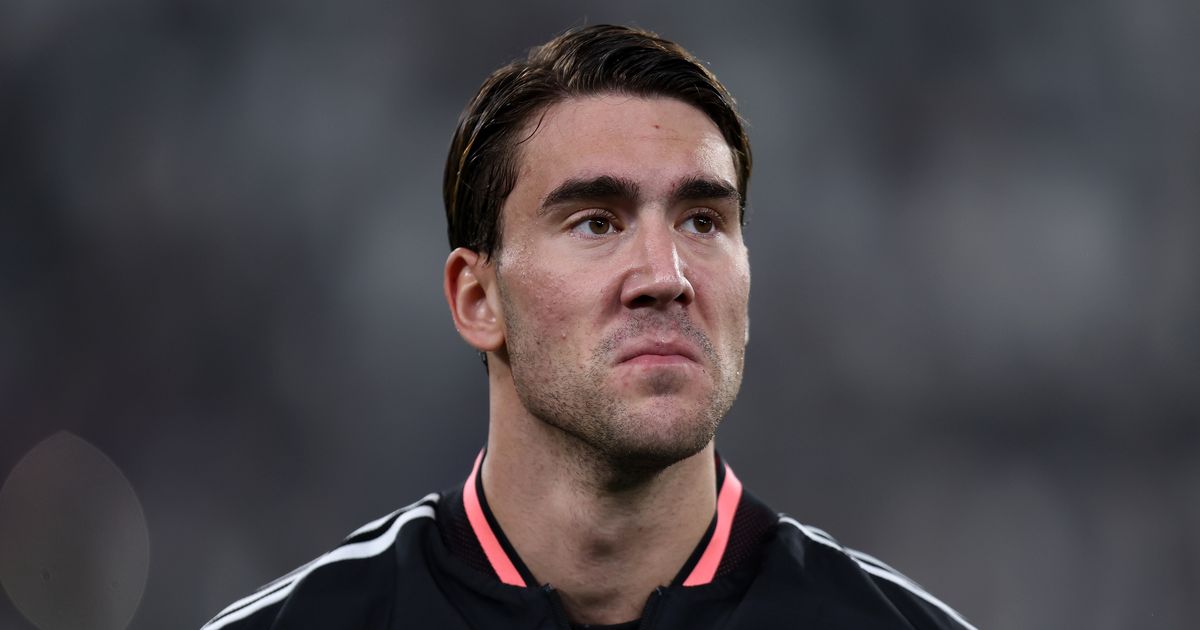The football transfer market, a perpetual carousel of speculation, ambition, and hard-nosed negotiation, often presents a paradox: a player can be highly desired yet simultaneously unattainable. Such is the current predicament surrounding Dusan Vlahovic, the prolific Serbian striker currently plying his trade at Juventus. As the season kicks off, the whispers of potential transfers continue, yet Vlahovic finds himself in a fascinating, if somewhat restrictive, position – a superstar seemingly held captive by the very success of his prior contractual agreements.
AC Milan`s Striker Search: A Glimmer of Hope?
For a club like AC Milan, the need for a formidable goalscorer is seldom far from the headlines. Following a less-than-ideal start to their campaign, with squad limitations highlighted by key injuries and departures, the Rossoneri are reportedly keen to bolster their attacking options. Vlahovic, with his proven Serie A track record and predatory instinct in front of goal – a quality he recently reaffirmed with a debut goal – presents an attractive profile. He embodies the physicality and clinical edge that could inject new life into Milan`s offensive line. However, between desire and reality lies a financial chasm.
The €12 Million Net Question: A Wage Barrier
The crux of the issue lies squarely in Vlahovic`s current contract with Juventus. He commands a staggering €12 million net salary per season. In the cutthroat world of football economics, this figure is not merely a number; it`s a significant barrier to entry for many potential suitors, including AC Milan. While Milan undoubtedly covets Vlahovic`s talents, their financial framework, governed by both internal policy and broader financial fair play considerations, reportedly caps their offer at around €6 million per year – precisely half of Vlahovic`s current earnings.
«Dusan Vlahovic`s impressive talent is undeniable, but his substantial wage package acts as a formidable golden handcuff, tethering him to his current club while frustrating the aspirations of potential suitors.»
This substantial discrepancy creates an immediate impasse. Why would a player willingly halve his income, especially when still under contract at a club of Juventus`s stature? The answer, typically, is that they wouldn`t, unless an exceptional sporting project or a personal desire for a change of scenery heavily outweighs the financial implications.
The Agent Factor: An Additional Hurdle
Adding another layer of complexity to this already intricate saga are the demands of Vlahovic`s representatives. Reports suggest his agents have been unwilling to negotiate a «spreading» of his current salary over a longer term with Juventus, a common tactic used to manage high wage bills. Furthermore, any potential transfer would necessitate an additional outlay: an estimated €15 million in agent commissions. This figure, while perhaps a mere `pocket change` in the stratospheric sums of modern football transfers (spoken with a hint of technical irony), becomes a prohibitive cost when added to an already challenging salary negotiation.
For Milan, or any other club for that matter, to pay a substantial transfer fee, double a player`s preferred salary, and then shell out an additional €15 million in agent fees, would represent an almost insurmountable financial commitment for a single player. It makes the operation «onerous and difficult,» as aptly described by industry insiders.
The Limited Horizon: A Superstar in Stasis?
This financial entanglement has created a unique stasis for Vlahovic. Despite his talent, the market for a player with such a high wage bill and associated costs appears limited. Domestically in Italy, alternatives are scarce for clubs capable and willing to meet such demands. Internationally, the situation isn`t much clearer. While there`s been a «timid probe» from Fenerbahce – a club now under the high-profile management of José Mourinho – it`s widely understood that the Turkish league doesn`t align with Vlahovic`s career aspirations at this juncture.
Thus, Vlahovic finds himself in a peculiar «hostage» situation – not by choice, but by the very terms of a lucrative contract that once signified success. He is a valuable asset, undeniably, but one whose price tag extends far beyond a simple transfer fee, encompassing an entire financial ecosystem that few clubs can currently afford to disturb. For now, it seems the golden cage of his Juventus contract will continue to hold one of Europe`s most promising strikers, as the transfer market continues its relentless, yet sometimes self-limiting, dance.

